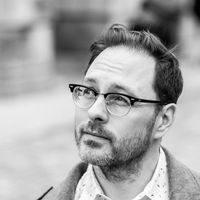"A Title Has to Win A Reader Over... Twice" Matthew Tierney on His Eye-Catching New Title & How Titles Function
Midday at the Super-Kamiokande (Coach House), the newest collection by Matthew Tierney is named after a neutrino observatory in Japan, which gives readers a good bit of context for where the Trillium-winning poet is coming from in his fourth collection. Strange and playful, the poems combine the elements of the title - the quotidian of "midday" with the fantastic of the "Super-Kamiokande". Thoughtful, witty, and searching, Tierney's work intelligently interrogates the obscure and finds meaning in the abstract. It's an exciting collection from a consistently innovative poet and we're excited to welcome Matthew to Open Book today.
As part of our title-obsessed Entitled series, he explains his eye-catching title in his own words, gives us his personal Griffin Prize-style shortlist for titles, and shares his favourite, rather surreal, title from the new collection.
Open Book:
Tell us about the title of your newest book and how you came to it.
Matthew Tierney:
The Super-Kamiokande is a neutrino observatory in Japan. Neutrinos are near-massless particles that pass through most matter; they’re passing through you right now as you read this. Under certain conditions—say 1,000 metres underground, a pool with 50,000 tonnes of ultrapure water—one could catch sight of a neutrino colliding with another particle. It’s not YOUR chocolate coming together with MY peanut butter, but it’s pretty special. From it, we get a glimpse into origins of the big bang, the sun, supernovas. The poems in this book revolve around, touch upon, tease and outright raspberry the idea of evidence—empirical evidence, but also evidence of meaning, evidence of presence or evidence of absence. The full title, Midday at the Super-Kamiokande, adds with ‘midday’ an element of the quotidian: work, process, duration. Which are also good descriptors of how I came to it.
OB:
What, in your opinion, is most important function of a title?
MT:
The title for a poem collection has to win the reader over. This happens twice. Once, when they see your book’s title for the first time, and again when they read the last poem in your book, and it resonates anew. The collection title is your most persistent lobbyist.
Titles of individual poems are more important but harder to either quantify or qualify. Long, short, pithy, plain—whatever. But it’s easy for a poem title to seem an afterthought, or merely utilitarian. I believe I can spot those ones, and no matter how good the poem it headlines, I mentally dock marks.
OB:
What is your favourite title that you've ever come up with and why? (For any kind of piece, short or long.)
MT:
My favourite title in this collection is 'Who Said Owl the Owl Who Said Who.' First off, I love the oohs and ahs of the vowel sounds as they trip along. But it’s also a riddle of sorts, tipped off by the first line of the poem, which references Wittgenstein’s proposition, 'The riddle does not exist.' Hint: It does. Hint: It involves Winne-the-Pooh.
OB:
What is your favourite title as a reader, from someone else's work?
Your CanLit News
Subscribe to Open Book’s newsletter to get local book events, literary content, writing tips, and more in your inbox
MT:
Here is my Griffin-style shortlist of recent collections whose titles I find compelling. The winner will be announced in June, in my head:
International
The Captain Asks for a Show of Hands, Nick Flynn
Soft Sift, Mark Ford
Trances of the Blast, Mary Ruefle [a truly inspired lift from Coleridge]
Canadian
Don’t Be Interesting, Jacob Mooney
Broom Broom, Brecken Hancock
Joy Is So Exhausting, Susan Holbrook
OB:
How do you feel about single-word titles?
MT:
Cromulent.
_______________________________
Matthew Tierney is the author of three previous books of poetry. His most recent is Probably Inevitable, which won the 2013 Trillium Book Award for Poetry in English. His previous book, The Hayflick Limit, was shortlisted for a Trillium Book Award. He is a recipient of the K. M. Hunter Award, and has placed his poems in numerous journals and magazines across Canada. He lives in Toronto.





